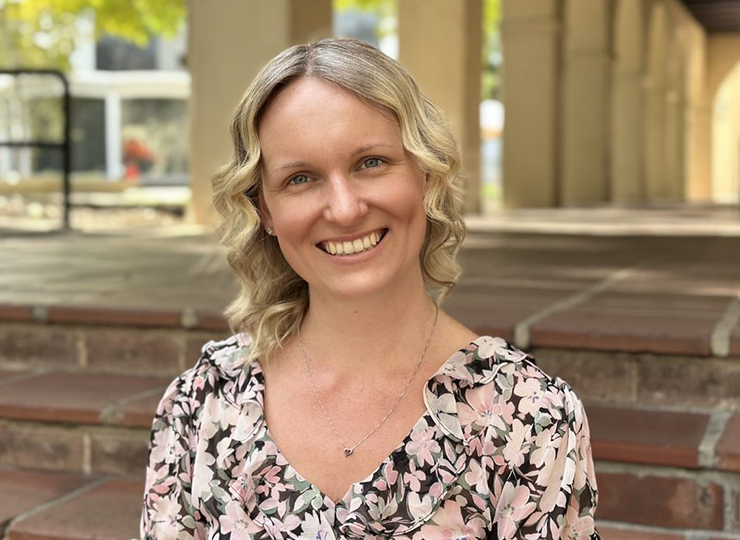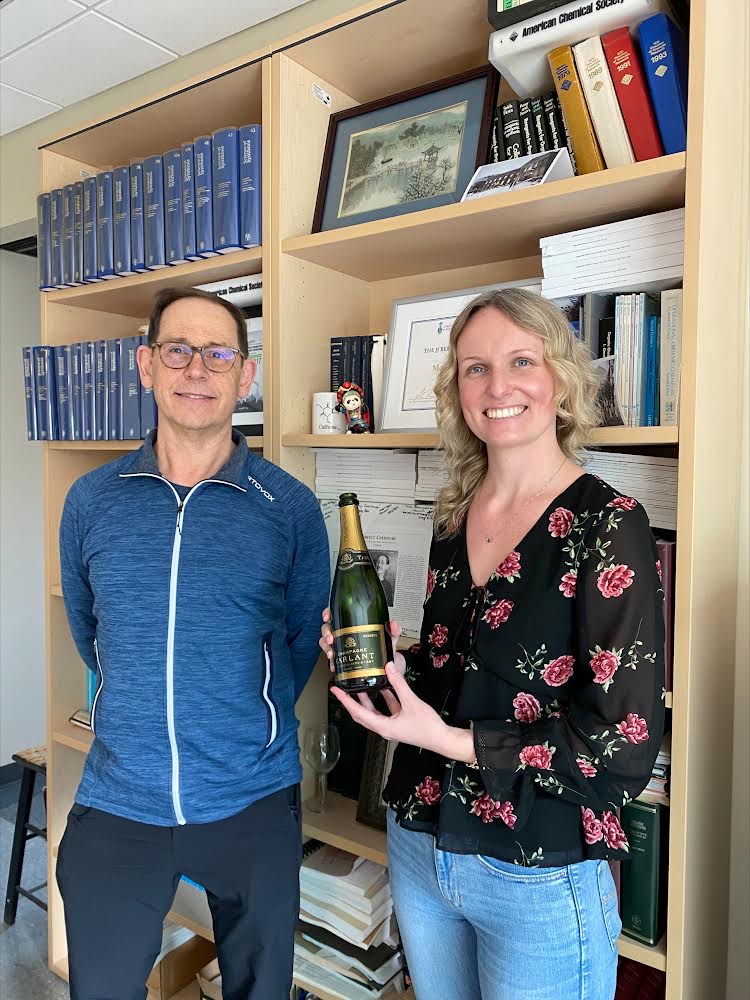Dr. Rachel Baker is currently in her second year as an Assistant Professor in the Department of Chemical Engineering at Queen’s University. Her lab studies how to increase sustainability of chemical production by lessening the reliance on fossil fuels, both as a source of mass and energy. They examine how renewable energy in the form of electricity can be used to power chemical reactions in place of burning fossil fuels.
The Baker Lab also investigates ways to replace fossil fuel feedstock with greenhouse gases when forming valuable chemical products—a process Baker describes as a win-win, since this also removes greenhouse gases from the atmosphere.
In this Department of Chemistry Alumni profile, Baker reflects on her childhood visions of becoming a journalist and going into finance, discovering the joy of solving chemistry’s hardest puzzles at U of T, and the journey that led to her being chosen as one of the 2025 Forbes 30 under 30 in Science.

Chemistry Stories asked:
Taking a faculty position at Queen's University has brought you home, in a sense. Is that right?
Rachel Baker: My roots in Kingston run deep—I grew up here and pursued my Bachelor’s degree in Engineering Chemistry at Queen’s. I went on to study organic chemistry for my PhD at the University of Toronto, supervised by Professor Mark Lautens.
Before returning to Kingston, I completed a postdoctoral fellowship at Caltech with Professor Karthish Manthiram.
At Queen’s, I love teaching, both supervising researchers and teaching my class: Organic Process Development, a third-year Engineering Chemistry class that looks at how to design chemical processes for industrial implementation. I’m also involved with several outreach efforts tailored to sparking scientific curiosity in youth, such as Science Rendezvous and workshops put on by Queen’s Connections.
Outside of my life at Queen’s, I like to read, travel, stay active and of course spend time with my family.
Can you tell us about what sparked your interest in chemistry, and how that brought you to U of T?
I didn’t always love science. For the longest time, I thought I wanted to be a journalist or go into business, finance in particular, as I liked math. In grade 10 was the first time we learned about chemical equations, and how to balance them. The relationship between math and science caught my attention.
Credit goes to my high school chemistry teacher, because he had a real knack for making chemistry seem interesting and could tie it to real world applications really well.
When I started researching career types, I learned that if I studied Chemical Engineering, I could use both math and chemistry to solve real world problems, which excited me. The unique Engineering Chemistry program at Queen’s felt like a perfect fit with the dual accreditation in both engineering and chemistry, and let me keep my options open if I wanted to go either way. After going through the program, I found my real passion was organic chemistry and when I came to the grad student visitation weekend at U of T, I fell in love with the program. The people in the Lautens group (including Mark himself) seemed like people I could get along with and would love spending five years with, AND the chemistry was interesting—how lucky was that?
What was your time at UofT like? Who did you work with and what did you study?
I loved my time at U of T. I worked with Prof. Lautens studying diastereoselective dearomative cyclopropanation reactions—just a fancy way of saying I made molecules that had carbon atoms arranged in a 3-membered ring.
The fun thing about our chemistry is we were exploring completely new reactivity, making molecules nobody has ever made before. That was so exciting to me, discovering uncharted territory, and I loved exploring chemical mechanisms, figuring out how the molecules came together in a reaction to produce something new. It felt like solving a puzzle.
Another big part of my PhD was a collaboration with Professor Peter Roy’s group in Biology, where I made molecules that they tested for activity against a type of worm that infects crops. I really liked this project, as it had a direct application. I got to not only make molecules that I knew were being used and would make an impact, but it was fun to play around with the chemical process to make these molecules and figure out how to make it more efficient and better for when we needed larger quantities.
My PhD was a nice combination of two parts of organic chemistry: developing new reactions and using chemical reactions to make products for a specific use.
Sometimes on a graduate school journey, people hit low points... and you were here at Chemistry during the COVID lockdown, which started 5 years ago. What kind of challenges did you have to surmount?
Oh boy, COVID. Yes, this was definitely a difficult time. Restrictions made it tough to get work done. We were on a shift schedule, so we had less time per day to get work done in the lab. And some experiments had to be really carefully coordinated; for example, if the shifts were only 6 hours but you needed to do an 8 or 12 hour experiment, you had to coordinate with multiple people to get that to work out.
Not to mention the fact that the lab was shut down for just over 3 months during which we couldn’t do ANY experiments, so it was hard to feel like we were progressing in the PhD program.
But the hardest part about COVID was not getting to be with my peers in the lab. I made some great friends in Mark’s lab, and really enjoyed the day-to-day chatter, telling my tales from the TTC, and learning together. Even once we went back, many of my friends were on the opposite schedule from me so I never saw them.
In addition to COVID challenges, of course the PhD program is also just tough. Research (which doesn’t always work out the way it was planned), courses, TA duties, funding applications, extracurriculars, eventually writing a thesis and finding a job, mentoring younger students and working with people in general. Oh and did I mention trying to have a personal life?
I do not envy grad students. I like to think the fact that I went through it recently (ish) helps me with managing my current group. Having to juggle all this in grad school does prepare one for a life in academia though; there are benefits to getting through the challenges we face in grad school.
COVID was definitely a difficult time. Restrictions made it tough to get work done. We were on a shift schedule, so we had less time per day to get work done in the lab. And some experiments had to be really carefully coordinated; for example, if the shifts were only 6 hours but you needed to do an 8 or 12 hour experiment, you had to coordinate with multiple people.
You were chosen as one of the Forbes 30 under 30 in Science—essentially, a recognition of your having done meaningful work at a young age. Forbes cited your work in manufacturing industrial and consumer chemicals in a sustainable way. What is it like to be celebrated for high achievement in your career path at such an early age? Does it create pressure? Opportunities?

Oh, thank you! Definitely both. It’s beneficial because one of the hard parts about being a new professor is recruiting students, especially in engineering, where most students are there to get a job in industry and want to go to work applying their degree rather than going into research uncovering new knowledge. As a new professor your name isn’t out there yet, on students’ radar. So it’s nice to be noticed and highlighted, show students that our group exists and does really cool research.
But at the same time, all eyes are on you, and it feels like you need to do something big, and fast. Exciting research ideas don’t grow on trees, and even once you have one, just because it works in your head and there’s logic there to back it up doesn’t mean it will work in practice.
How did you get from Chemistry here in Toronto to Queen’s? What advice might you give current graduates seeking a similar role?
An opportunity came up, and I decided to go for it! And I would say the same thing to anyone looking for advice. There’s rarely ever a “right time” for anything. I actually thought I was industry-bound during my PhD, but then when I saw the posting come up, I thought it seemed like a perfect fit for me, and that I would be the right person for the job.
I think that’s key too, I know “believe in yourself” sounds corny, but it’s true. Imposter syndrome infects all of us, so why not you for the job, or the award, whatever it is.
How have you maintained your relationship with the Department?
Mostly through the Lautens group. I’m still in touch with Mark, and any time anyone from the department that I know comes to Queen’s I make sure to reach out. For my first time hosting a speaker in my department, I chose Dr. Helen Tran, who was an excellent mentor to me while I was applying for my position at Queen’s.
And of course, bringing it back to the Lautens group, I’m still in touch with many of my former lab mates. We attend each other’s weddings and even though we are spread out all over the world now, we always make a visit happen when we can.
Grad school is tough, but it gave me friends for life, I’ll always be grateful for U of T for that (and of course, the education)!
I loved exploring chemical mechanisms, figuring out how molecules came together in a reaction to produce something new. It felt like solving a puzzle.


